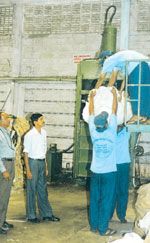|
Turning
worthless documents into valuable waste paper
In this day and age of information technology, electronic mail and e-business where filing documents is an electronic process and a paperless society has emerged, ever wondered how some companies in Sri Lanka get rid of their confidential documents that clog valuable office space? Through small shredding machines? Yes, in some cases when the quantities are small, but not when companies have tons of confidential papers to destroy. In an innovative and environmentally friendly move, Neptune Papers (Pvt) Ltd (NPL), part of the Expolanka Group, has created a unique way in which companies can dispose of their confidential documents. Being in the waste paper collection business for the last seven years, the company offers a free service to any organisation which wants to dispose of its confidential documents (CD). Their success is seen by the fact that all banks and financial institutions, except for two, entrust the disposal of their CD to the NPL. This is in addition to a large number of other institutions. Recently a government institution sent 120 metric tons of CD to the NPL plant to be destroyed. The Sunday Times FT recently watched the NPL processing plant at work at Wellampitiya. One of the NPL collection vehicles arrives at the plant with an approximate load of one ton of CD from a bank with a representative to ensure that the paper is shredded and not simply discarded. The documents are dumped right at the processing machine inside the huge building that houses' the processing and storage of disposal paper. Several workers sit round the dump and start sorting out foreign matter such as metal and plastics under the watchful eyes of the representative. Sorted out paper are fed to the machine which crushes the paper into tiny pieces which is then fed to another machine for mixing and compressing into bales. The entire load is done within a matter of around one hour. NPL has been so reliable that some institutions do not send their representatives. NPL disposes an average 200 metric tons of CD per month. CD disposal is not the only part of business for the NPL. It is a market leader with a 52 percent share of the waste paper collection and export in Sri Lanka. Their closest rival exports only 15 percent. The company began collecting large corrugated cardboard boxes and turning it into small boxes. In the process, officials were unsure how to dispose of the residue waste piling up. NPL then learnt that waste paper could be exported to India for recycling. From then onwards the company became the leading expert on collection and disposal of waste paper, and now collects around 2,500 metric tons of various types of waste paper per month. It purchases
any quantity from any person at its factory premises at Wellampitiya.
The three heavy-duty
industrial machines could shred 1,300 kilos per hour and the supply
is ensured from more than 200 clients. They include banks, financial
institution, large organizations, government departments and also
small firms. Faizal said that through achieving targets in recycling of waste paper and protecting the environment, the company has made the public aware of the benefits to the environment and the financial benefits in recycling. He said NPL offers a golden opportunity for local authorities to separate waste paper from the garbage collections and send it to the company. In 2002 a total of 45,991 tons of waste paper was exported while during the period January to June 2003 the quantity exported was around 28,334 tons with the total for the year expected to be 56,668 tons. |
||||
Copyright © 2001 Wijeya Newspapers Ltd. All rights reserved. |
